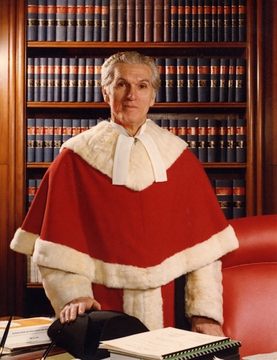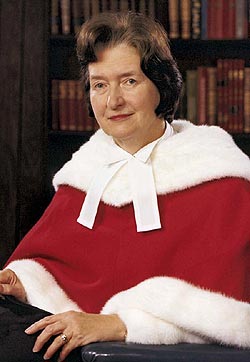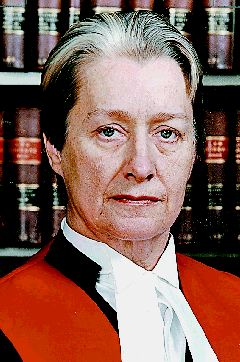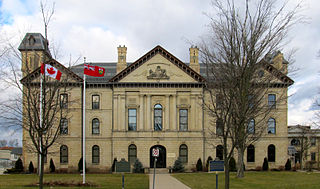Related Research Articles

The legal system of Canada is pluralist: its foundations lie in the English common law system, the French civil law system, and Indigenous law systems developed by the various Indigenous Nations.
In common law systems, a superior court is a court of general jurisdiction over civil and criminal legal cases. A superior court is "superior" in relation to a court with limited jurisdiction, which is restricted to civil cases involving monetary amounts with a specific limit, or criminal cases involving offenses of a less serious nature. A superior court may hear appeals from lower courts. For courts of general jurisdiction in civil law system, see ordinary court.

Bora Laskin was a Canadian jurist who served as the 14th chief justice of Canada from 1973 to 1984. Laskin was appointed a puisne justice of the Supreme Court in 1970, and served on the Ontario Court of Appeal from 1965 to 1970. Before he was named to the bench, Laskin worked as a lawyer and in academia.

Emily Murphy was a Canadian women's rights activist and author. In 1916, she became the first female magistrate in Canada and the fifth in the British Empire after Elizabeth Webb Nicholls, Jane Price, E. Cullen and Cecilia Dixon of Australia. She is best known for her contributions to Canadian feminism, specifically to the question of whether women were "persons" under Canadian law.
Patriation is the political process that led to full Canadian sovereignty, culminating with the Constitution Act, 1982. The process was necessary because, at the time, under the Statute of Westminster, 1931, and with Canada's agreement, the British Parliament retained the power to amend Canada's British North America Acts and to enact, more generally, for Canada at the request and with the consent of the Dominion. That authority was removed from the UK by the enactment of the Canada Act, 1982, on March 29, 1982, by the Parliament of the United Kingdom, as requested by the Parliament of Canada.

Bertha Wernham Wilson was a Canadian jurist and the first female puisne justice of the Supreme Court of Canada. Before her ascension to Canada's highest court, she was the first female associate and partner at Osler, Hoskin & Harcourt and the first woman appointed to the Court of Appeal for Ontario. During her time at Osler, she created the first in-firm research department in the Canadian legal industry.
Coverture was a legal doctrine in English common law originating from the French word couverture, meaning "covering," in which a married woman's legal existence was considered to be merged with that of her husband. Upon marriage, she had no independent legal existence of her own, in keeping with society's expectation that her husband was to provide for and protect her. Under coverture a woman became a feme covert, whose legal rights and obligations were mostly subsumed by those of her husband. An unmarried woman, or feme sole, retained the right to own property and make contracts in her own name.

Thomas Rodney Berger was a Canadian politician and jurist. He was briefly a member of the House of Commons of Canada in the early 1960s, entering provincial politics thereafter. He led the British Columbia New Democratic Party for most of 1969, prior to Dave Barrett. Berger was a justice of the Supreme Court of British Columbia from 1971 to 1983. In 1974, Berger became the royal commissioner of the Mackenzie Valley Pipeline Inquiry, which released its findings in 1977. After retiring from the bench, Berger continued to practise law and served in various public capacities. He was a member of the Order of Canada and the Order of British Columbia.
The court system of Canada is made up of many courts differing in levels of legal superiority and separated by jurisdiction. In the courts, the judiciary interpret and apply the law of Canada. Some of the courts are federal in nature, while others are provincial or territorial.

The Supreme Court of British Columbia is the superior trial court for the province of British Columbia, Canada. The Court hears civil and criminal law cases as well as appeals from the Provincial Court of British Columbia. There are 90 judicial positions on the Court in addition to supernumerary judges, making for a grand total of 108 judges. There are also 13 Supreme Court masters, who hear and dispose of a wide variety of applications in chambers.

The British Columbia Court of Appeal (BCCA) is the highest appellate court in the province of British Columbia, Canada. It was established in 1910 following the 1907 Court of Appeal Act.

Robert William Pickton, also known as the Pig Farmer Killer or the Butcher, was a Canadian serial killer and pig farmer. After dropping out of school, he left a butcher's apprenticeship to begin working full-time at his family's pig farm, and inherited it in the early 1990s.

Sir Henry Pering Pellew Crease was a British-Canadian lawyer, judge, and politician, influential in the colonies of Vancouver Island and British Columbia. He was the first Attorney General of the united Colony of British Columbia, and sat on the Supreme Court of that province for 26 years.

Lance Sydney George Finch, was a Canadian lawyer and jurist. He was President of the Vancouver Bar Association and a bencher of the Law Society of British Columbia. He was appointed as a judge in 1983 and went on to serve as the Chief Justice of the British Columbia Court of Appeal from 2001 until his retirement on June 16, 2013.
Carol Baird Ellan, K.C. is a Canadian retired judge, the former Chief Judge of the Provincial Court of British Columbia, and a former federal political candidate. Appointed Chief Judge on July 14, 2000 at age 43, she was the second youngest chief judge in BC history and the first female chief of the BC Provincial Court.

Women work in the legal profession and related occupations throughout Canada, as lawyers, prosecutors, judges, legal scholars, law professors and law school deans. In Canada, while 37.1% of lawyers are women, "50% ...said they felt their [law] firms were doing "poorly" or "very poorly" in their provision of flexible work arrangements". It was also reported that, in 2006 in Ontario, "racialized women accounted for 16% of all lawyers under 30" and that only 1% of lawyers were Aboriginal.
Kimberly Nixon is a transgender woman who filed a human rights complaint against Vancouver Rape Relief & Women's Shelter Society (VRRS) for discrimination. VRRS argued that Nixon, a transgender woman, did not have the same life experiences as someone who is female and, therefore, could not volunteer as a peer rape counsellor. The case was heard at the British Columbia Human Rights Tribunal, British Columbia Court of Appeal, and Supreme Court of British Columbia, each of which rejected Nixon’s complaint. On February 1, 2007, the Supreme Court of Canada dismissed Nixon’s request to appeal the decision.
Bryan Williams is a Canadian lawyer and retired judge from Vancouver, British Columbia. He was a puisne justice on the British Columbia Court of Appeal and also Chief Justice of the British Columbia Supreme Court. In addition to an extensive litigation practice, he was heavily involved in a number of organizations relating to the practice of law and the administration of justice, including a term as national president of the Canadian Bar Association.

Mary Frances Southin is a retired Canadian judge. She was the first woman to become a Queen's Counsel in British Columbia, to be elected a Bencher of the Law Society of British Columbia, and to be a head of a law society in the Commonwealth. She was a Justice of the British Columbia Court of Appeal from 1988 to 2006.

Ontario, Canada, date from the early to mid-17th century. French civil law courts were created in Canada, the colony of New France, in the 17th century, and common law courts were first established in 1764. The territory was then known as the province of Quebec.
References
- 1 2 3 Moore, Christopher (2010). The British Columbia Court of Appeal: The First One Hundred Years, 1910–2010. Osgoode Society for Canadian Legal History; University of British Columbia Press. pp. 198–199. ISBN 978-0-7748-1864-3. OCLC 489949313.
- 1 2 "Judicial Updates". Canadian Bar Association.
- ↑ "Conference looks at children and the law". The Ring. Vol. 10, no. 5. University of Victoria. February 10, 1984. p. 2.
- ↑ "Two courts get new judges". The Vancouver Sun . September 19, 2003. pp. B6. ISSN 0832-1299. ProQuest 242393454.